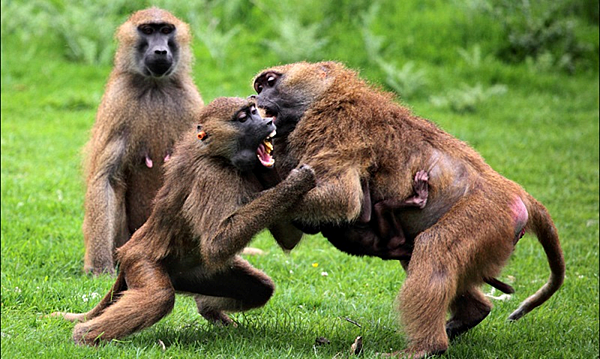Aggressed-Upon Monkeys Take Revenge on Aggressor's Cronies
挨打的猴子會找打人的好兄弟算帳
By Karen Hopkin on March 21, 2017
影音說明檔:https://drive.google.com/open?id=0B-Bg0auB-gcoOWlyT1o2N3o5djg
Don’t mess with a monkey. Because if you do, he’s might take revenge on your family and friends. That’s according to a study of Japanese macaques, which shows that monkeys keep track of each others’ associates and make use of that intel when it comes time for payback. The findings are in the Royal Society journal Open Science.
根據一項對日本獼猴(Japanese macaques [mə'kɑk])的研究,不要招惹(mess with)猴子,因為你如果惹牠,牠可能會對你的家人和朋友進行報復(take revenge on your family and friends),研究報告顯示,猴子們會持續追查了解(keep track of )每一個夥伴(associates),利用(make use of )得到得情報(intel)以備復仇的時間到來(when it comes time for payback)。這項研究調查在英國皇家學會(Royal Society )的Open Science期刊上發表。
Researchers were interested in the question of how primates suss out social relationships, knowledge that can come in handy for maneuvering within a complex society. To assess how the macaques obtain and make use of such social know-how, the researchers decided to focus on episodes of aggression - a common feature of simian interactions.
研究人員的興趣在這些靈長類(primates)是如何搞清楚(suss out )牠們的社會關係,特別是在複雜的社會下運作(maneuvering)這關係,說不定到了哪天就能派上用場(come in handy),為了評估(assess )這些獼猴如何獲取並運用(make use of)這種社會實用技能(know-how),研究人員決定專注在分析牠們的攻擊挑釁事件上(episodes of aggression ),這是猴類(simian)非常常見的互動。
They went through more than 500 hours of video recordings showing the exchanges that took place in a group of 57 macaques living in the Rome Zoo - monkeys whose genealogical ties are well known. And they parsed some 15,000 episodes of aggression, noting the relationships among the individuals involved.
他們從頭到尾看完(went through)超過五百小時的影片(video recordings ),紀錄羅馬動物園裡57隻獼猴發生(took place )互相挑釁鬥毆(exchanges, 即exchange of aggression, 比方 exchange of fire 交火),他們對這群猴子的家族關係(genealogical ties)都非常清楚。然後對一萬五千次鬥毆進行解析(parsed),並記錄彼此之間的親戚關係。
First, they confirmed that monkeys that find themselves at the receiving end of aggression tend to turn around and take it out on(出氣) a third party(第三者). And that retaliation(報復) is often directed at a relative (親屬) of the original aggressor(挑釁者).
首先,他們確定(confirmed)說,那些受攻擊的(at the receiving end)猴子會轉向(turn around)第三者(third party)出氣(take it out on),而這些報復,通常會指向原來挑釁者(aggressor)的親屬(relative)。
But how do the monkeys determine who’s kin(親屬)? Well, one way would be that they’ve been around long enough to have watched each other grow up. But that doesn’t seem to be the case. When researchers looked specifically at conflicts involving older monkeys, it didn’t seem that relatives were singled out for revenge.
但是,猴子怎麼去確認誰是誰的親屬(kin)?嗯,可能原因之一是,他們生活再一起,互相從小時候看到大,但似乎並不是這一回事(that doesn’t seem to be the case),當研究人員特地觀察這些猴子的衝突裡面有年長的猴子,似乎沒有說親屬被特別挑選出來(singled out )進行報復。
What does seem to be true is that victims will target their attacker’s associates - the other monkeys he hangs around with. If they’re not his relatives, they’re probably his cronies. So, close enough.
比較接近事實的情況是,受害者(victims)會把復仇目標針對攻擊者的朋友(associates),也就是跟他在一起混(hangs around)的猴子,如果這些猴子不是親戚,那就是他們的麻吉(cronies 狐群狗黨),所以說,關係夠熟了
Interestingly, there’s a benefit to hitting family members when you’re meting out justice. Macaques that sought out the kin of the monkeys they wanted to settle a score with were less likely to be picked on again in the future. Whereas(反之) wailing on the friends appeared to offer only present satisfaction, but no such future protection.
Which suggests if you’re gonna beat on someone for payback, it should at least be a monkey’s uncle.
有趣的是,當你打算伸張正義(mete out justice)的時候,打親屬是有好處的。找(sought out)親屬出來算舊帳(settle a score with)的獼猴,以後就不太可能再被挑出來打。因此儘管你在朋友們面前哭訴靠么(wailing on),只能在當時給你心理安慰(present satisfaction),對未來的安全一點兒用也沒有。
這就意味著如果你打算為了報仇(payback)去揍人(beat on someone),你最少也得是猴子的叔叔。




 留言列表
留言列表


